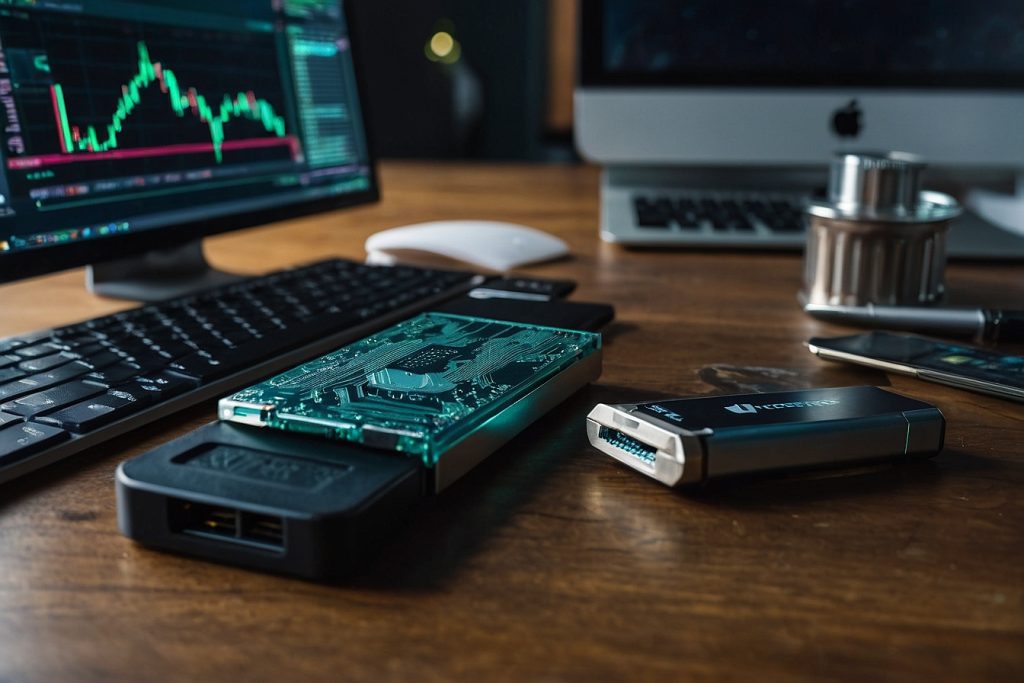
Your Crypto Cash: How Digital Wallets Work to Keep Your Coins Safe
Unlike the leather wallet in your back pocket, crypto wallets don’t actually store any money. They store the keys that allow you to access cryptocurrency funds on the blockchain – a decentralized digital ledger. There are different types of wallets, each with their own security perks and risks. Choosing the right one helps protect your virtual assets.
Picture paying for pizza in Bitcoin instead of bucks. To make that happen, you use a crypto wallet – special software that safeguards the keys to your cyber cash. Traditional money kept under your mattress isn’t connected to the banking system. But virtual currency exists entirely online, verified by an open record of transactions called the blockchain. So crypto wallets act like gatekeepers to secure your digital funds.
The Two Key Keys
All crypto wallets have a public key and a private key, which are super long, random strings of numbers and letters. You can freely share your public key to receive payments, kinda like giving someone your Venmo username. But your private key proves you actually own the funds associated with that wallet address. So you gotta keep it secret – like your bank PIN code or the password to your Netflix account. If someone gets that private key, it’s game over…they now control your money and can spend it as they please!
The public key points to the location of your wallet on the blockchain. That spot lists the “balance” of cryptocurrency linked to that address. The private key allows you to update the ledger by sending payments from that wallet location to others. Together, they permit access to view and transfer crypto holdings.
Picking Your Digital Billfold
There are three main types of crypto wallets to stash your blockchain bucks – software, hardware, and paper. They work kinda like the apps, cards, and cash in your money clip. The main difference is their level of internet connectivity and security precautions. Let’s check out how to pick the right wallet style for your virtual value safekeeping and spending needs!
Live Software: Handy Like A Mobile App
Cryptocurrency software wallets connect directly to the web and are often free downloads to your laptop or phone. They may come preloaded on exchange and broker accounts too. Think of these hot wallets like the Venmo, CashApp or Apple Pay apps you use for daily spending money. They’re convenient for frequent transactions, but more vulnerable to digital theft.
One popular mobile choice is Trust Wallet’s app, which supports many different virtual currencies. It offers handy features like QR codes to quickly receive payments from crypto friends. But since these wallets remain linked online 24/7, keep only small amounts here for regular use, like the cash in your pocket. The bulk of your blockchain bankroll belongs in colder storage.
Cold Hardware: Safely Stashed Offline
For deeper asset protection minus the cybersecurity threats, many crypto investors use cold hardware wallets. These work like the secure chip debit and credit cards in your bifold…except they remain entirely offline. Leading options are sleek USB devices from Trezor and Ledger that let you store, receive and send currency without exposing private keys to the web.
Think of cold storage hardware as virtual valuables in a safe deposit box. Online attacks can’t reach crypto assets kept “on ice” off the internet. But like losing a chip card, misplacing the gadget means you might be locked out from account access forever. For about $50-200 each, these handheld hard wallets offer solid security for serious coin hoarders!
Paper Backups: Low-Tech Yet Still Secure
Ultimately, private keys themselves simply prove ownership of blockchain balances linked to their matching public wallet address. Some crypto investors keep this sensitive info offline entirely for disaster backup using old-school paper wallets.
Services like BitcoinPaperWallet.com let you generate a random public address and private key, then print a QR code version ready for cold storage. Think of these paper safeguards like the birth certificates and passports locked up at your parents’ house. While not very mobile, paper copies offer reliable protection if you lose device access or hardware fails.
When it comes to securing your digital assets, cryptocurrency empowers you to become your own bank! The right wallet helps protect the personal keys to your blockchain balances. Make sure to choose wisely based on your transaction and security priorities. With crypto empowering decentralized finance, the power lies in people worldwide – including you!